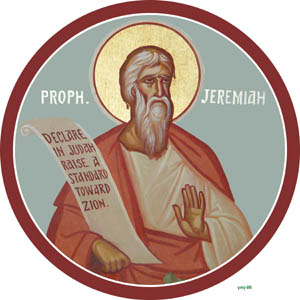The
Prophetic Calling of Jeremiah
Stephen
Terry
Commentary
for the October 3, 2015 Sabbath School Lesson
 “The
words of Jeremiah son of Hilkiah, one of the priests at Anathoth in the
territory of Benjamin. The word of the Lord came to him in the thirteenth year
of the reign of Josiah son of Amon king of Judah, and through the reign of
Jehoiakim son of Josiah king of Judah, down to the fifth month of the eleventh
year of Zedekiah son of Josiah king of Judah, when the people of Jerusalem went
into exile.” Jeremiah 1:1-3, NIV
“The
words of Jeremiah son of Hilkiah, one of the priests at Anathoth in the
territory of Benjamin. The word of the Lord came to him in the thirteenth year
of the reign of Josiah son of Amon king of Judah, and through the reign of
Jehoiakim son of Josiah king of Judah, down to the fifth month of the eleventh
year of Zedekiah son of Josiah king of Judah, when the people of Jerusalem went
into exile.” Jeremiah 1:1-3, NIV
Recently
I had the opportunity to see a video of a father calming his newborn daughter.
As she was attended to by the medical staff, she would become alarmed by all
that was going on and begin to cry. But when she heard her father’s soothing
voice, she would immediately calm down and even open her eyes and look lovingly
at him. Her father believes this is because he often spoke the same way to her
while she was still in the womb. There is a magic that takes place after
conception and before birth that perhaps more of us should realize. Only
twenty-two days after conception, the heart of the new baby begins to beat with
the pulsating rhythm that attends us for all of lives.[i] When healthy, we do not
even need to think about it. As an apt metaphor for God’s sustaining
providence, it goes on doing its job no matter who we are, good or bad.
Apparently,
God, like that father, can speak into the womb and call us from before we were
born to serve Him, for He tells Jeremiah that is exactly what He did for him.[ii] This is a startling
thought when we realize that millions of children over the years have never
been given the opportunity to respond to any sort of call because they were
slain before they could be born.[iii] When we couple that with
the Psalmist’s claim that God knits us together in the womb, we can begin to
see perhaps how frustrating it must be for God to deal with our perfidy.
Fortunately, in the case of Jeremiah, living in a different time, he was born
and grew to an age where God could remind him of that prenatal calling.
Perhaps
Jeremiah felt some sort of call but associated it with his being born into the
priesthood, a hereditary office. But if that is the basis for a prenatal call,
then what does that mean to us who are part of a universal priesthood?[iv] Are we all called from the
time before we were born? Paul perhaps thought so. He at times spoke of a
predestination which he also associated with a calling by God.[v] If this is indeed God’s method
of relating to us, universal and going back to before birth, we not only are
confronted with the abortion problem, but what does this also mean for gender
specific ordination? Is this simply another way of cutting off those whom God
has called, with the exception it is after birth, rather than before? God
calls, but we sadly seem to have so many methods, both institutional and
otherwise, for preventing that calling from being fully realized.
In
any event, in Jeremiah’s time, abortion was not widespread, and he had the good
fortune to be born male, so he had the opportunity to mature into the calling
God set before him. Nonetheless, he felt that his youth disqualified him. It is
hard to say what his age was, his feelings may have been associated with the
teaching that priests did not serve until they were thirty years of age.[vi] Thus he could have been a
young man in his twenties, not fully a priest, but headed that way. In some
ways then, he may have been like an Old Testament Paul, who was a Pharisee, the
son of a Pharisee,[vii]
zealous for the temple, but not yet aware of his true calling. Both, in spite
of their heritage and personal commitment, were called directly by God for a
specific purpose.
Moses,
who was called through a burning bush, was tending sheep.[viii] He was living about as
far as one might be from the calling of leading an entire nation out of
bondage. Paul was actually attacking and attempting to do as much harm as he
could to the followers of Jesus Christ.[ix] Perhaps, in a similar
manner, when God made Jeremiah aware of his calling he was following in the
footsteps of those priests who had gone before him. However, now he was called
to be a force of opposition to the evolved practices of clergy and ruler alike.
Like Paul in Rome and Moses on the Nile River, Jeremiah’s calling eventually took
him from the remoteness of Anathoth to the capital city, Jerusalem.
It
seems that some today would love to be the prophets who “cry aloud, and spare
not,”[x] but they do not handle
opposition well and they rarely have the gift of being able to speak to power.
Rather some self-styled prophets too often like to be the ones in power,
exercising spiritual control over their weaker brothers and sisters. They are
not invited into the presence of rulers, as were Paul, Moses and Jeremiah. Perhaps
this is because they fail to demonstrate the self-effacing service of God’s
genuine prophets. They will not submit humbly to the humiliations often
inflicted upon God’s true servants. The only quality they may deem worthy of
emulation as Christian or prophetic is the ability to accuse others. However,
that work does not necessarily originate with God, for it is another who takes
delight in being the “accuser of the brethren.”[xi]
Those who wish to exercise the office of a prophet in order to weed evil out of
the church would do well to consider the words of Jesus in His parable about
weeding.[xii] That parable seems to be
a caution against weeding the church, revealing that the line between sinner
and saint is not always easily discerned. The work is better left to God, who,
through the active agency of the Holy Spirit, is far better able to make that
distinction. However, per the parable, even God has set aside the culling until
the end-time harvest when the angels will be the harvesters, not us.
‘So what are we to do about sin in the church?” someone might ask. Simply this:
we each have a work to do in a field where we can readily be discerning and
where the Holy Spirit will aid us. Our own lives should be the focus of our
attention. We will find an endless field of endeavor there that will take us
all the way to the Parousia. Each day we can come before God, sacrificing self
and placing ourselves at His service. Thereby we might find ourselves better
able to serve others effectively. We may find the keys to having compassion and
understanding for others through such daily devotions. We may also understand a
deeper significance behind struggles and events in our own lives.
It
is important that we understand the difference, though, of serving others as
opposed to placing ourselves under their control. If we choose to do the latter,
then we are choosing to leave God’s service for that of another. Perhaps this
was what Jesus was inferring when He said, “If someone forces you to go with
them one mile, go with them two.”[xiii] If you do what the
person orders you to do, then they are in control. However, if you exceed their
demand by an amount determined by you, then you have retaken control.
But
we should not do this for the purpose of being in control of others. Rather it
should be for the purpose of removing ourselves from their control that they
might be able to hear and see our witness more clearly that there is a better
way, a way where control comes through surrender.
Jeremiah
may have felt he was in control of his life with a clear career path to the
priesthood. But when God reached into his life with the real calling he had
been unknowingly preparing for, he was faced with a dramatic choice. He could
ignore God’s calling, all the while pretending to serve Him by doing his
priestly duties, or he could take the more difficult path and say with the
prophet Samuel, “Speak Lord for your servant hears.”[xiv] Fortunately, Jeremiah
chose the path of a prophet. As a result, his experiences and his witness have
echoed down through the ages in the book that bears his name.
As
we study that book this quarter, we may wish to ask ourselves, “Who is in
control of our spiritual experience?” Have we surrendered that control to
another person who feels it is their responsibility to play Holy Spirit for us?
Or have we preferred to stay in control of our own lives, steering our own
course without outside intervention? Or maybe we have taken the third option,
the option of Jeremiah, and surrendered the direction of our lives to God,
following His leading, wherever it may take us.
